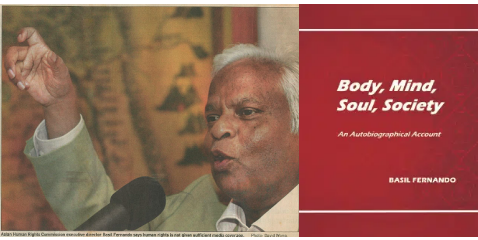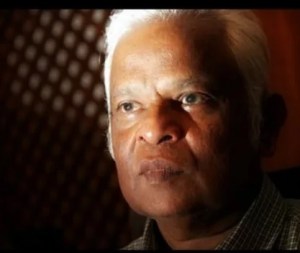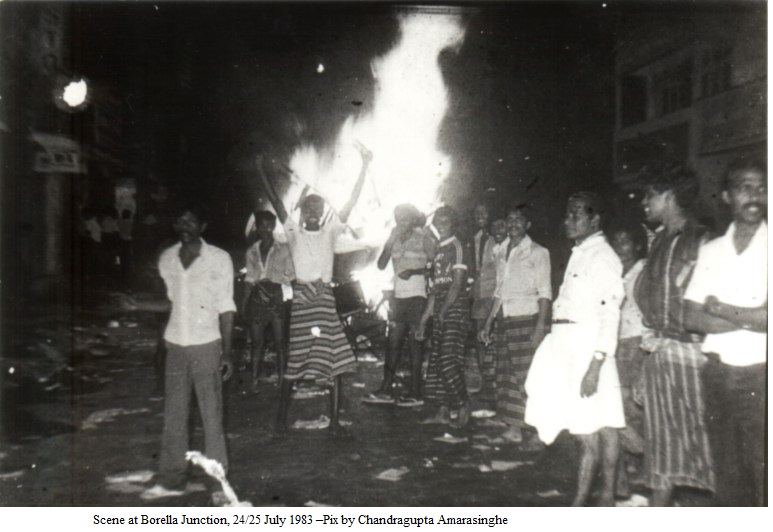An article from Thuppahi’s Blog, written by Michael Roberts forwarded by the Asian Human Rights Commission
Basil Fernando: A Short Abstract re the book Body, Mind, Soul, Society: An Autobiographical Account
This book (176 pages) is an attempt to contribute towards an understanding of the impact of violence on human persons and the society. It is based on the direct experience of living and working in Sri Lanka and Cambodia. However, references are also made to several more developing countries in Asia with which I have been engaged in working after the experiences in Sri Lanka and Cambodia. The book is written from the perspective of a victim who is also an observer.
 It attempts to cover the period of violence mainly in the south of Sri Lanka during the time of the second JVP uprising through the circumstances which compelled me to leave Sri Lanka and details of many individual narratives of what happened to several others whose personal experiences were known to me. Although the book is autobiographical in nature, it is an attempt to tell a general story of violence and the societal implications of such violence through an authentic account of [my experiences] as in such a narrative I could authenticate the veracity of every statement that is being made.
It attempts to cover the period of violence mainly in the south of Sri Lanka during the time of the second JVP uprising through the circumstances which compelled me to leave Sri Lanka and details of many individual narratives of what happened to several others whose personal experiences were known to me. Although the book is autobiographical in nature, it is an attempt to tell a general story of violence and the societal implications of such violence through an authentic account of [my experiences] as in such a narrative I could authenticate the veracity of every statement that is being made.
The stories on Cambodia are also those in which I was personally involved. Working as a senior officer of the United Nations Transitional Authority of Cambodia (UNTAC) and the first branch of the UN Centre for Human Rights in Cambodia, I had the opportunity of being directly involved with many individuals and also to observe the sort of institutions that existed in early 1990s after the destruction caused by Pol Pot’s Khmer Rouge regime and also earlier through the American bombings of Cambodia.
In order to give some feel of the circumstances around which I lived in Sri Lanka before leaving in 1989, I also provided some details about village life in a coastal belt with also some short description of natural circumstances.
In order to emphasize the philosophical implications of what I have witnessed I have also included a number of my poems written during these times.
My attempt was to present the problem of violence not only from the point of view of countries like Sri Lanka and Cambodia, but to present violence from the point of view of its implications for the modern world as a whole.
***** *****
THE BOOK: Copyright © 2021 Basil Fernando …….First edition, January 2021 ……..Design, layout, and production: Thomas P. Fenton
The English translation of the poem “God Keep Me from Going Mad” (p. 3 below) by Aleksandr Solzhenitsyn (as published in English in 1972) is reproduced with kind permission from the Aleksander Solzhenitsyn Center and the translator, Michael Scammell.
All rights reserved. No part of this book may be reproduced in any form or by any means, electronic or mechanical, including photocopying, re- cording, or by any information storage and retrieval system without per- mission in writing from the author.
*****************

CONTENTS
Glossary………………………………………………………………………. vii
Foreword…………………………………………………………………….. viii
Preface…………………………………………………………………………. xi
Both Victim and Observer……………………………………….. 1
Violence Begins…………………………………………………………. 5
Departure…………………………………………………………………. 11
Arrival………………………………………………………………………. 22
Efficiency and the Benefits of Compliance………….. 28
Employment……………………………………………………………. 31
Vietnamese Boat People…………………………………………. 37
Family……………………………………………………………………….. 43
Heirs to Water………………………………………………………….. 47
Reflections……………………………………………………………….. 55
Cambodia’s Loss of Memory…………………………………. 60
Loyalty and Fear………………………………………………………. 68
Continuity and Change……………………………………………. 72
Compromise…………………………………………………………….. 79
UNTAC’s Contribution…………………………………………… 87
Birth of an Idea……………………………………………………….. 92
Dysfunction and Disorder……………………………………. 102
Global Protests against Police Brutality………………. 114
Village Morality……………………………………………………… 117
Early Mentors………………………………………………………… 126
Dark Night of the Soul………………………………………… 139
Sunshine…………………………………………………………………. 149
Poetry and Prose……………………………………………………. 152
Near-death Experiences……………………………………….. 165
Mysticism……………………………………………………………….. 170
Body, Mind, Soul, Society……………………………………… 174
Epilogue……………………………………………………………………. 176
A NOTE from Michael Roberts, 20 June 2021
I first got to know Basil Fernando in the 1990s (and maybe in 1989 or so?) via email when he was in Hong Kong working with a human rights organization. We lost touch subsequently. It is pertinent for me to disclose that he is from the Rada caste dispensation and grew up in the coastal “Catholic belt” north of Colombo – a fact suggestive of personal experiences of discrimination in the past. Needless to say his work experiences in Cambodia would have inscribed the world of societal traumas (plural here) more deeply into his soul.
As a tourist in Cambodia at some point in the 2000s, I absorbed only a glimpse of the horrific tales from the Pol Pot era (our local male guide being a child in one of he Pol-Pot prison camps). However, my experiences in Sri Lanka in two longish spells in 1987 and 1989 have been more influential in colouring my own commentary because of ethnographic data etched in my mind then (inclusive of a chat with Victor Ivan of St Aloysius College, Galle, at Ananda Chittambalam’s house in Kensington Gdns Road, Bambalapitiya). This haphazard stock of “knowledge’ has also been leavened by comparative explorations into “communal violence” in India through research work in Delhi in 1995 –inclusive of chats with Indian reporters and editors and work in their editorial archives.
Basil’s direct and second/hand experiences of the violence directed at Sri Lankan Tamils in July 1983 is, of considerable consequence in our exchanges because his ‘witness’ is inscribed indelibly in the details presented in my article “The Agony and Ecstasy of a Pogrom in Southern Lanka , july 1983” -see pages 320-22 in the 1994 version of my article [ there is a repetition in Nethra in 2003).

PERTINENT ARTICLES: Roberts
1989 “Apocalypse or Accommodation? Two Contrasting Views on Sinhala-Tamil Relations in Sri Lanka”, South Asia, 12: 67-83.
1990 “Noise as Cultural Struggle: Tom-Tom Beating, the British and Communal Disturbances in Sri Lanka, 1880s-1930s,” in Veena Das (ed.), Mirrors of Violence: Communities, Riots, Survivors in South Asia, Delhi: O.U. P., pp. 240-85.
1996 “Teaching Lessons and Removing Evil: Strands of Moral Puritanism in Sinhala Nationalist Practice,” Felicitation Volume for Professor S. Arasaratnam, edited by Michael Pearson, as South Asia, sp.issue, Sept. 1996, pp. 205-20.
1998-99 “Emotion and the Person in Nationalist Studies,” Sri Lanka Journal of the Humanities, vol. XXIV & XXV, pp. 65-86.
2001 “Dakunen sädi kotiyo, uturen golu muhudai,” [The fierce/vile Tamils to the south, the turbulent/unfathomable sea to the north] PravÄda 6: 17-18.
2003 “The agony and ecstasy of a pogrom: southern Lanka, July 198,3, NÄ“thra, April-Sept 2003, 6: 199-213.
……………..
The views shared in this article do not necessarily reflect that of the AHRC.